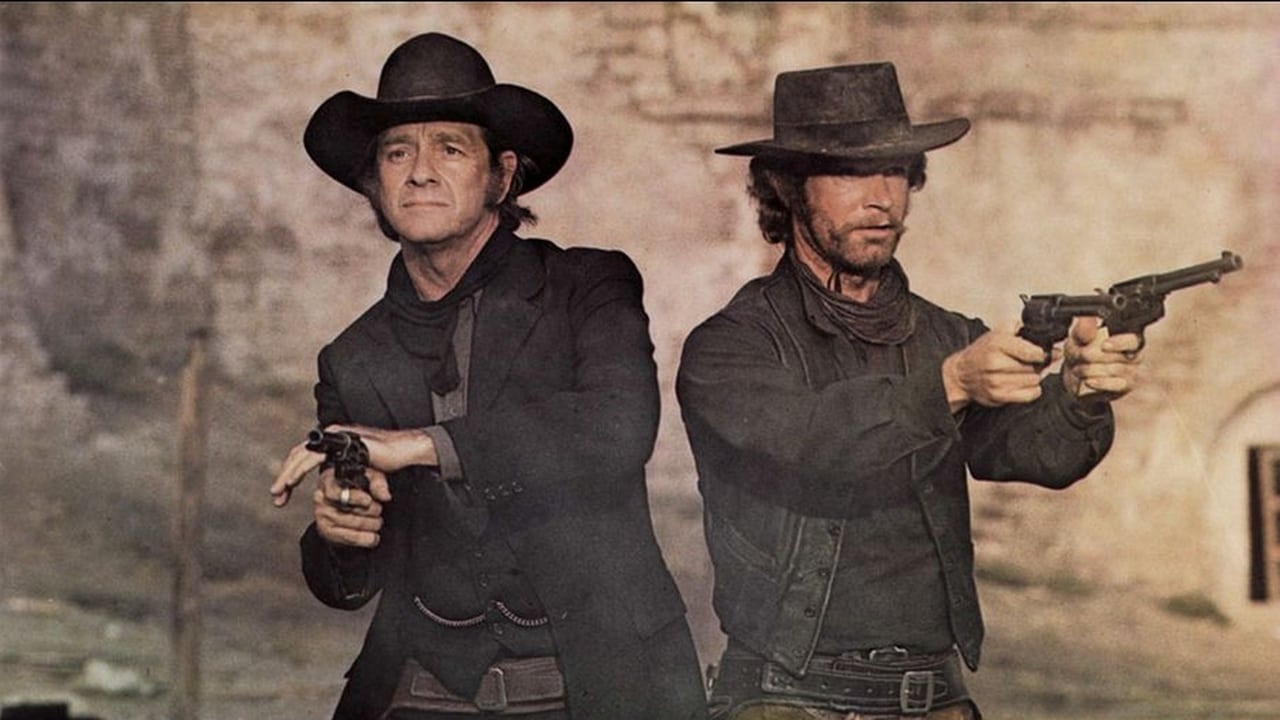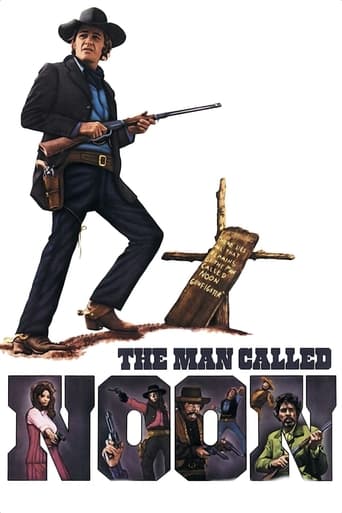Kattiera Nana
I think this is a new genre that they're all sort of working their way through it and haven't got all the kinks worked out yet but it's a genre that works for me.
Freaktana
A Major Disappointment
Livestonth
I am only giving this movie a 1 for the great cast, though I can't imagine what any of them were thinking. This movie was horrible
Senteur
As somebody who had not heard any of this before, it became a curious phenomenon to sit and watch a film and slowly have the realities begin to click into place.
Woodyanders
Gunfighter Ruble Noon (a fine and credible performance by Richard Crenna) gets amnesia. Crafty outlaw Rimes (smoothly played by Stephen Boyd) helps Noon figure out his identity. After it's discovered that Noon knows about a hidden fortune in gold, slippery judge Niland (a pleasingly slimy turn by Farley Granger) and the ruthless Peg Cullane (a deliciously wicked portrayal by Patty Shepard) conspire together to get their hands on said gold. Director Peter Collinson relates the engrossing and intricate story at a steady pace, maintains a fairly tough and gritty tone throughout, makes nice use of the dusty'n'desolate desert locations, and stages the exciting shoot outs and rough'n'ready fisticuffs with skill and flair. The compelling script by Scot Finch and Antonio Recoder offers a few nifty twists. The sound acting by the bang-up cast rates as another major asset: Rosanna Schioffino as the sweet Fan Davidge, Aldo Sambrell as the cowardly Kissling, and Jose Jaspe as loyal ranch hand Henneker. Luis Bacalov's robust harmonic score hits the rousing spot. John Cabrera's polished cinematography provides lots of striking shots of the beautiful scenery. A worthwhile film.
zardoz-13
"Innocent Bystanders" director Peter Collinson emphasizes action shrouded in mystery in scenarist Scot Finch's cinematic adaptation of Louis L'Amour's novel "The Man Called Noon," with Richard Crenna plagued by amnesia while a passel of trigger-happy pistoleros do their best to pack him full of lead. "Conan the Barbarian" lenser John Cabrera photographed this invigorating oater on various scenic Spanish locations where earlier westerns, such as Sergio Leone's "Once Upon a Time in the West" and John Guillermin's "El Condor," had been shot, and Collinson and he frame each shot so that this dusty, windswept horse opera is easy on the eyes. James Bond movie aficionados should savor the fact that stunt man Bob Simmons (the guy in the gun barrel sequences of "Dr. No" and "From Russia, With Love" arranged the stunts. The scenes of horsemen toppling from their saddles and horses plunging into the camera are genuinely exciting. Crenna faces the same trouble that Matt Damon would confront forty or so year later with his loss of memory. Mind you, it takes one spectacular fall from a hotel balcony and later another down the side of a mountain for our stalwart hero to recover his wits while his adversaries blast away at him. Oscar winning actor Stephen Boyd and former MGM contract player Farley Granger cannot seem to figure out what side they are on and whether they are going to riddle our hero. Similarly, two women—Italian beauty Rosanna Schiaffino of "The Long Ships" and Patty Shepard of "The Stranger and the Gunfighter"—stand on either side of our protagonist, but they have already decided what they are going to do about him. The last-minute showdown between these two dames is something to see, especially with Shepard decked out in black with a flat-crowned hat. Collinson and Finch don't lollygag around in this sagebrusher. Just as Jonas Mandarin (Richard Crenna of "Catlow") has finished dressing in his hotel room in Kiowa Flats, villainous sharpshooter Ben Janish (Ángel del Pozo of "Hell in the Aegean") creases Jonas' scalp with a bullet, and Jonas crashes through his window and falls into the street. Scrambling to escape from a search party of armed desperadoes, our resilient hero climbs aboard a train pulling out of town. Janish's henchmen assemble to find, but they lose him. Meantime, Jonas dashes across the rooftops of box cars (this is splendidly staged by Collinson) as the train chugs away into the distance. He winds up in a box car with a scruffy, six-gun toting owlhoot, Rimes (Stephen Boyd of "Ben-Hur"), and they behave like partners for a while. Eventually, they end up at a ranch presided over by the lovely Fan Davidge (Rosanna Schiaffino) who suffers under the tyranny of Janish. After Fan cleans up Jonas' scalp wound, our hero joins a group of ruffians in a nearby bunkhouse and proves his wits with his fists. He slugs it out with a couple and then settles down for a long overdue nap. The following day, Jonas saddles himself a horse with Fan's permission. Rimes and he gallop off into the wilderness. Rimes warns Jonas that the area is rift with 50 box canyons with no way out of them. Nevertheless, our wily protagonist finds a fortress of a stone house off in the mountain. This innocuous looking place looks comfortable within and Jonas leads Rimes to an elevator to a cave and an outlet where they catch a ride aboard another train. Collinson and Finch release information in piecemeal fashion to keep us in the dark as long as possible, and things slowly come together when Jonas learns about a lawyer named Cullane who has been recently killed. Stealthily, Jonas inventories Cullane's office, and he runs into Cullane's homicidal sister and later a character named Judge Niland (Farley Granger of "Strangers on a Train") who initially appears to be a good guy. Later, we learn that the noble judge isn't so noble, and he wants to kill Jonas. Our hero, Rimes, and Fan are trapped in the stone-house during the last quarter hour and have to shoot it out with hordes of henchmen while they contend with dynamite being hurled at them and smoke from burning sagebrush. As you can see, Collinson refuses to let the action loiter, and "The Man Called Noon" doesn't let up throughout its 98-bullet-blasting minutes. Richard Crenna is appropriately tight-lipped and he displays his prowess with a pistol as he keeps knocking down targets on rooftops and behind doors in the fortress sequence. "The Man Called Noon" qualifies a hard-riding western that doesn't wear out its welcome.
Wizard-8
Despite the presence of Richard Crenna, "The Man Called Noon" is a real obscurity - I couldn't find a listing for it in any of my movie reference books, and I have a lot in my personal library! But it didn't take long watching it to figure out why it is unknown today. Now, I will say that the director manages to pump in a lot of atmosphere into just about every scene, and occasionally there is some decent action. However, the movie is all the same a tough slog. It is remarkably slow for a European western, with the movie remaining at a near standstill for long periods. The screenplay also suffers with the amnesia subplot - not much is done with it, and what there is has a strong degree of extreme familiarity. No freshness there. Also, there are some strange changes in tone - one scene the movie is trying to be a gritty western, and then it suddenly changes into a western with a more epic tone. In short, the movie is a real mess, and even fans of Euro westerns might be squirming in their seats.
Eric Chapman
There's a thin line between good style and bad style, and this film lands squarely on the wrong side of that line. The director knows a few camera tricks, such as filming scenes from severely low angles with a cowboy boot or wagon wheel dominating the frame (copied from countless other spaghetti westerns) but he has no feel or flow. Oddball cast. Richard Crenna, not exactly the most physical of actors, is hilariously unbelievable as a tough man of action. Your guess is as good as mine as to how he wins all those fist fights. And he's either bionic or a cousin of Bruce Willis' character in "Unbreakable", because he survives a couple nasty falls and countless flurries of gunfire with nary a scratch. In fact, the villains in this movie have to be the worst shots in the history of film. The more I think about it, I'm not sure who or what they were aiming at but it couldn't have been Crenna. There's Stephen Boyd, about a decade past his prime, drawling and mumbling his way through a turn as some sort of a slippery opportunist, the Han Solo role. Actually not a bad performance. And also Farley Granger, 20 years or so removed from his fling with matinee idol stardom. He's a more interesting looking actor at this point with graying hair and richer voice, but he comes off as all kinds of ridiculous in the big dumb, senseless finale. Hard to tell if his acting is much improved with such a poor script.It's also got an inappropriately exuberant music score, bad stunt doubling, a confusing plot with too many names you never can attach to faces, and some gratuitous violence that might have been offensive if it hadn't been so nonsensical. Despite all that, at least it DOES make an attempt to stylize the material and give it a little pizazz. That's more than some films do.

